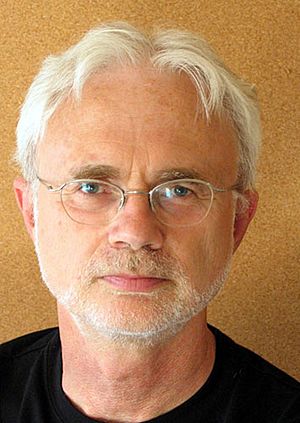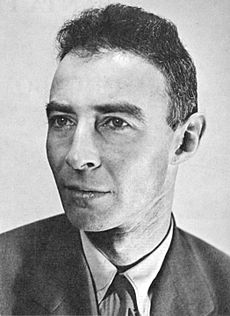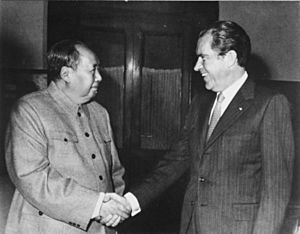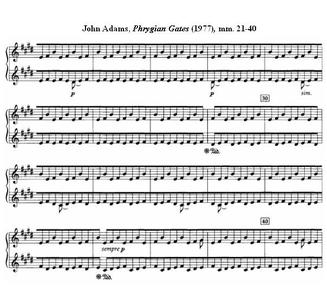John Adams (composer) facts for kids
Quick facts for kids
John Adams
|
|
|---|---|

Adams, sometime before 2008
|
|
| Born | February 15, 1947 Worcester, Massachusetts, U.S.
|
| Education | Harvard University |
| Occupation |
|
|
Notable work
|
List of compositions |
| Spouse(s) | Deborah O'Grady |
| Awards |
|
John Coolidge Adams (born February 15, 1947) is a famous American composer and conductor. He is known for his modern classical music, especially his operas, which often tell stories about important historical events. Besides operas, he has written many other types of music, including pieces for orchestras, concertos (music for a solo instrument with an orchestra), and music for choirs and smaller groups of instruments.
Adams grew up in Worcester, Massachusetts, in a family that loved music. He listened to many kinds of music, like classical, jazz, and rock. He went to Harvard University to study music. At first, his music was very modern, but he later changed his style after reading a book by John Cage. Adams started teaching at the San Francisco Conservatory of Music. There, he developed a simpler style of music called "minimalism." His pieces Phrygian Gates (1977) and Shaker Loops (1978) showed this new style. He became well-known for his orchestral works like Harmonium and Harmonielehre (1985). Other popular pieces from this time include Short Ride in a Fast Machine (1986).
Adams's first opera was Nixon in China (1987). It tells the story of Richard Nixon's visit to China in 1972. This opera was the start of many projects with theater director Peter Sellars. Another opera, The Death of Klinghoffer (1991), was based on a real event: the 1985 hijacking of a ship and the murder of a passenger. This opera caused a lot of discussion because of its topic. Adams also wrote On the Transmigration of Souls (2002) to remember the victims of the September 11, 2001 attacks. This piece won him a Pulitzer Prize for Music. His opera Doctor Atomic (2005) is about J. Robert Oppenheimer and the creation of the first atomic bomb.
Adams's music often uses ideas from minimalist composers like Steve Reich and Philip Glass. However, he also adds big, powerful sounds like those found in music by Romantic composers such as Wagner and Mahler. He has won many awards, including the Pulitzer Prize, the Erasmus Prize, and several Grammy Awards.
Contents
Early Life and Musical Journey
Growing Up with Music
John Coolidge Adams was born in Worcester, Massachusetts, on February 15, 1947. As a child, he lived in Woodstock, Vermont, and later in East Concord, New Hampshire. His family spent summers by Lake Winnipesaukee, where his grandfather ran a dance hall. His family didn't have a TV, and they didn't get a record player until he was ten.
Both of Adams's parents were musicians. His mother sang with big bands, and his father played the clarinet. John grew up listening to jazz, American folk music, and Broadway musicals. He even met the famous jazz musician Duke Ellington at his grandfather's dance hall once.
Learning to Compose
When he was in third grade, Adams started playing the clarinet. He took lessons from his father and later from a professional musician. He played in local orchestras and bands while in school. Adams began writing his own music at age ten. He heard his music performed for the first time when he was a teenager. He finished high school in 1965.
Adams then went to Harvard University. He earned his bachelor's degree in 1969 and his master's degree in 1971. He studied composition with several teachers, including Leon Kirchner and Roger Sessions. While at Harvard, he conducted the student orchestra for a while. At first, Adams was very interested in modern music styles. However, he later changed his mind.
After college, Adams read a book by John Cage called Silence: Lectures and Writings. This book made him rethink his ideas about music. He decided to move to San Francisco. From 1972 to 1982, he worked at the San Francisco Conservatory of Music. He taught classes and led the school's New Music Ensemble. In the early 1970s, Adams also experimented with electronic music.
Becoming a Well-Known Composer
Finding His Unique Sound
In 1977, Adams wrote a piano piece called Phrygian Gates. He later called it his "first mature composition." The next year, he created Shaker Loops, a piece for seven string instruments. In 1979, he wrote his first orchestral work, Common Tones in Simple Time.
In 1979, Adams became an adviser for the San Francisco Symphony. He helped create special concerts for new and unusual music. The symphony asked him to write a large piece for choir and orchestra called Harmonium (1980–81). After a period where he found it hard to compose, Adams wrote Harmonielehre (1984–85). He said this piece showed his belief in the power of traditional musical sounds.
Operas and Big Projects
From 1985 to 1987, Adams composed his first opera, Nixon in China. The story was written by Alice Goodman. It was about Richard Nixon's 1972 visit to China. This opera was the first time Adams worked with theater director Peter Sellars. They worked together on all his operas until 2022. During this time, Adams also wrote the short, exciting orchestral piece Short Ride in a Fast Machine (1986).
Adams also became a conductor, leading orchestras around the world. He conducted famous groups like the New York Philharmonic and the London Symphony Orchestra.
His second opera, The Death of Klinghoffer, was finished in 1991. It was based on the 1985 hijacking of a cruise ship and the murder of a passenger. This opera caused a lot of discussion because of its sensitive topic.
In 1992, Adams wrote his Chamber Symphony. This piece was inspired by both a classical composer and the fast-paced music from cartoons his young son watched! The next year, he wrote his Violin Concerto. He won an award for this concerto.
In 2000, Adams wrote El Niño, which is like an opera but tells a story using a choir and orchestra. It's about birth, especially the story of Jesus's birth.
After the September 11, 2001, terrorist attacks, the New York Philharmonic asked Adams to write a piece to remember the victims. He created On the Transmigration of Souls. This piece uses an orchestra, a choir, and a children's choir. It also includes recordings of victims' names and city sounds. It won the 2003 Pulitzer Prize for Music.

Adams's third opera, Doctor Atomic (2005), is about the scientist J. Robert Oppenheimer. It tells the story of the Manhattan Project and the creation of the first atomic bomb. The opera takes place in the hours before the first bomb was tested in New Mexico.
Recent Works and Legacy
Continuing to Create
Adams's opera A Flowering Tree (2006) is based on an old folktale from India. It tells the story of a girl who can magically turn into a flowering tree.
He wrote two string quartets and a concerto for string quartet and orchestra called Absolute Jest (2012). These pieces use musical ideas from the famous composer Ludwig van Beethoven.
In 2013, Adams wrote The Gospel According to the Other Mary. This work focuses on the last weeks of Jesus's life from the perspective of Mary of Bethany.
Scheherazade.2 (2014) is a piece for violin and orchestra. It was inspired by the character Scheherazade from One Thousand and One Nights, who tells stories to save her life. Adams connected this idea to challenges faced by women today.
His seventh opera, Girls of the Golden West (2017), is set during the California Gold Rush of the 1850s. It tells true stories of people from that time, including their struggles and adventures.
In 2022, Adams completed his eighth opera, Antony and Cleopatra, based on Shakespeare's famous play.
In June 2023, the Library of Congress announced that it would keep Adams's original music papers and manuscripts. This means his important works will be preserved alongside those of other great composers.
Personal Life
John Adams is married to photographer Deborah O'Grady. They have a daughter, Emily, and a son, Samuel Carl Adams, who is also a composer.
Musical Style
John Adams's music is often called "minimalist" or "post-minimalist." This means he uses repeating patterns and simple musical ideas that slowly change over time. However, he also adds big, rich sounds and powerful moments, like those found in music from the Romantic period.
Adams's style is different from some very strict modern music styles that use complex rules. He found inspiration in John Cage's ideas, which suggested that all sounds could be part of music. This helped Adams feel free to explore different sounds. He also realized that traditional musical sounds (called "tonality") were very powerful.
Adams sometimes mixes different styles in his music. For example, Grand Pianola Music (1981–82) uses musical ideas that sound like familiar tunes. In The Dharma at Big Sur, he uses music to describe the California landscape. Adams enjoys many types of music, not just classical. His parents were jazz musicians, and he also listened to rock music.
List of Works
Operas and Stage Works
- Nixon in China (1987)
- The Death of Klinghoffer (1991)
- I Was Looking at the Ceiling and Then I Saw the Sky (song play) (1995)
- El Niño (opera-oratorio) (2000)
- Doctor Atomic (2005)
- A Flowering Tree (2006)
- The Gospel According to the Other Mary (opera-oratorio) (2013)
- Girls of the Golden West (2017)
- Antony and Cleopatra (2022)
Orchestral Works
- Common Tones in Simple Time (1979)
- Grand Pianola Music (1982)
- Shaker Loops (for string orchestra) (1983)
- Harmonielehre (1985)
- The Chairman Dances (1985)
- Tromba Lontana (1986)
- Short Ride in a Fast Machine (1986)
- Fearful Symmetries (1988)
- El Dorado (1991)
- Lollapalooza (1995)
- Slonimsky's Earbox (1996)
- Naïve and Sentimental Music (1998)
- Guide to Strange Places (2001)
- My Father Knew Charles Ives (2003)
- Doctor Atomic Symphony (2007)
- City Noir (2009)
- I Still Dance (2019)
- Frenzy (2023)
- Rock You Stand On (2025)
Concertos (Solo Instrument with Orchestra)
- For Piano:
- Eros Piano (1989)
- Century Rolls (1997)
- Must the Devil Have All the Good Tunes? (2018)
- After the Fall (2024)
- For Violin:
- Violin Concerto (1993)
- The Dharma at Big Sur (for electric violin) (2003)
- Scheherazade.2 (2014)
- Other Concertos:
- Absolute Jest (for string quartet and orchestra) (2012)
- Saxophone Concerto (2013)
Vocal and Choral Works
- Ktaadn (1974)
- Harmonium (1980)
- The Nixon Tapes (1987)
- The Wound-Dresser (1989)
- Choruses from The Death of Klinghoffer (1991)
- On the Transmigration of Souls (2002)
Chamber Music (for Small Groups of Instruments)
- Piano Quintet (1970)
- Wavemaker (1975)
- Shaker Loops (for string septet) (1978)
- Chamber Symphony (1992)
- John's Book of Alleged Dances (for string quartet) (1994)
- Road Movies (for violin and piano) (1995)
- Gnarly Buttons (for clarinet and chamber ensemble) (1996)
- Son of Chamber Symphony (2007)
- Fellow Traveler (for string quartet) (2007)
- String Quartet No. 1 (2008)
- String Quartet No. 2 (2014)
Other Ensemble Works
- American Standard (1973)
- Grounding (1975)
- Scratchband (1996)
- Nancy's Fancy (2001)
Electronic Music
- Heavy Metal (1970)
- Hockey Seen: A Nightmare in Three Periods and Sudden Death (1972)
- Studebaker Love Music (1976)
- Onyx (1976)
- Light Over Water (1983)
- Hoodoo Zephyr (1993)
Piano Music
- Ragamarole (1973)
- Blue Light (1976)
- A Fox at Forty (1978)
- Phrygian Gates (1977)
- China Gates (1977)
- Hallelujah Junction (for two pianos) (1996)
- American Berserk (2001)
- Roll Over Beethoven (for two pianos) (2014)
- I Still Play (2017)
Film Scores
- Matter of Heart (1982)
- The Cabinet of Dr. Ramirez (1991)
- American Tapestry (1999)
- I Am Love (Io sono l'amore) – used existing pieces by Adams (2010)
- Call Me by Your Name, contributions (2017)
Orchestrations and Arrangements
- The Black Gondola (from Liszt) (1989)
- Berceuse élégiaque (from Busoni) (1989)
- Wiegenlied (from Liszt) (1989)
- Six Songs by Charles Ives (from Ives) (1989–93)
- Le Livre de Baudelaire (from Debussy) (1994)
- La Mufa (from Piazzolla) (1995)
- Todo Buenos Aires (from Piazzolla) (1996)
Awards and Recognition
Major Awards
- Pulitzer Prize for Music for On the Transmigration of Souls (2003)
- Erasmus Prize (2019)
Grammy Awards
- Best Contemporary Composition for Nixon in China (1989)
- Best Contemporary Composition for El Dorado (1998)
- Best Classical Album for On the Transmigration of Souls (2004)
- Best Orchestral Performance for On the Transmigration of Souls (2004)
- Best Classical Contemporary Composition for On the Transmigration of Souls (2004)
Other Awards
- Royal Philharmonic Society Music Award for Best Chamber Composition for Chamber Symphony (1994)
- University of Louisville Grawemeyer Award for Music Composition for Violin Concerto (1995)
- California Governor's Award for Lifetime Achievement in the Arts
- Cyril Magnin Award for Outstanding Achievement in the Arts
- Chevalier dans l'Ordre des Arts et des Lettres (Knight of the Order of Arts and Letters) (2015)
- Harvard Arts Medal (2007)
- 2018 BBVA Foundation Frontiers of Knowledge Award in Music and Opera
- Inducted into the American Classical Music Hall of Fame (2009)
Memberships
- Fellow of the American Academy of Arts and Sciences (1997)
- Member of the American Academy of Arts and Letters (1997)
- Foreign member of the Royal Swedish Academy of Music
Honorary Doctorates
- Honorary Doctorate of Arts from University of Cambridge (2003)
- Honorary Doctorate of Arts from Northwestern University (2008)
- Honorary Doctorate of Music from Duquesne University (2009)
- Honorary Doctorate of Music from Harvard University (2012)
- Honorary Doctorate of Music from Yale University (2013)
- Honorary Doctorate of Music from Royal Academy of Music (2015)
Other Recognition
- Creative Chair of the Los Angeles Philharmonic (2009–present)
See also
 In Spanish: John Adams (compositor) para niños
In Spanish: John Adams (compositor) para niños
 | Mary Eliza Mahoney |
 | Susie King Taylor |
 | Ida Gray |
 | Eliza Ann Grier |



